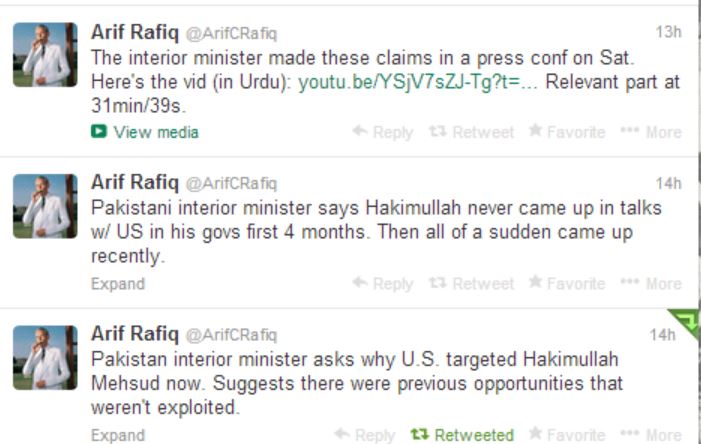Crazy Posturing Over Hakimullah Mehsud Drone Killing Drowns Out Key Question: Why Now?
We are awash in analyses of the drone killing on Friday of Hakimullah Mehsud, who was the leader of Pakistan’s Taliban. Declan Walsh in the New York Times captures much of the puzzlement in the DC establishment over why Pakistan is responding not with celebration that Mehsud is dead, but with sharp questions for the US over yet another violation of Pakistani sovereignty. Walsh’s quote from Bill Roggio sums it up perfectly (under a headline of “In Pakistan, Drone Strike Turns a Villain Into a Victim”):
Virtually nobody openly welcomed the demise of Mr. Mehsud, who was responsible for the deaths of thousands of Pakistani civilians. To some American security analysts, the furious reaction was another sign of the perversity and ingratitude that they say have scarred Pakistan’s relationship with the United States.
“It’s another stab in the back,” said Bill Roggio, whose website, the Long War Journal, monitors drone strikes. “Even those of us who watch Pakistan closely don’t know where they stand anymore. It’s such a double game.”
And Christine Fair provided another nuanced take on Mehsud:
Christine Fair, a South Asia expert at Washington DC’s Georgetown University, claimed there was little prospect of the proposed talks achieving anything.
“The Taliban killed 40,000 people. What lunatic thought there would be peace talks,” she said. “The American taxpayer is again taking out Pakistan’s terrorist garbage.”
Not to be outdone, Mike Rogers chimed in on Sunday:
Representative Mike Rogers, who chairs the House of Representatives’ permanent intelligence committee, said the slain militant, Hakimullah Mehsud, was a “bad guy” who was connected to attacks against Pakistani soldiers and to the Taliban in Afghanistan, which has forced closures of many schools for girls.
“This was a bad guy,” Rogers said on CBS’ “Face the Nation.”
“There’s some information recently that concerned us about the safety of our troops. I feel a little better for our troops today than I did before this event happened.”
But all of this bleating about “wrongful mourning” threatens to drown out a very important point. Pakistan’s Interior Minister Chaudhry Nisar Ali Khan held a press conference on Saturday. Dawn provides some coverage of his comments:
Speaking to both local and foreign media today, Nisar said the identity of those killed in the drone strike was irrelevant. “The government of Pakistan does not see this drone attack as an attack on an individual but as an attack on the peace process,” he said.
The interior minister said a three-member committee, comprising of Islamic clerics, was scheduled to leave for a meeting with the Tehrik-i-Taliban Pakistan (TTP) leadership on Saturday morning.
Claiming that TTP leadership including Hakimullah was aware of the meeting, he said he had written and telephonic records of recent correspondence between the government and the militant outfit.
/snip/
Chaudhry Nisar questioned timings of the Hakimullah’s killing by the US asking why he was targeted just a day before the talks. “Can this be called supporting peace initiative?”
Most press accounts of Nisar’s press conference include a reference to Nisar questioning the timing of the strike. But on Twitter yesterday, Arif Rafiq provided more details after reviewing a video of the press conference. It appears that Nisar went on to suggest that US interest in attacking Mehsud was only very recent and that previous opportunities to strike him had been bypassed:
Those two important bits of information from Nisar certainly provide a basis for the claim that the US drone strike on Mehsud seemed at least as much an attempt to derail the peace talks as it was to take out Mehsud himself. If previous opportunities had been skipped, it seems reasonable to conclude that his recent activities in moving toward peace talks were what got him killed.
It would appear that the reaction to Mehsud’s killing is continuing to gather steam inside Pakistan’s government. In addition to the calls from Imran Khan to block NATO traffic attempting to use the Khyber Pass crossing between Afghanistan and Pakistan, there is a reiteration today by Prime Minister Nawaz Sharif that US drone attacks in Pakistan are counterproductive:
Prime Minister Nawaz Sharif said “drone attacks are counterproductive” to Pakistan’s efforts for peace, Express News reported Monday.
But the venue in which Sharif delivered these remarks is very important:
He said this while speaking at Azm-e-Nau 4, one of the many military training exercises that are meant to introduce new war strategies.
And look what was included in the new war strategies:
The army allegedly shot down a drone during the exercise to demonstrate the development of anti-drone technology.
Stay tuned. This could get interesting.
